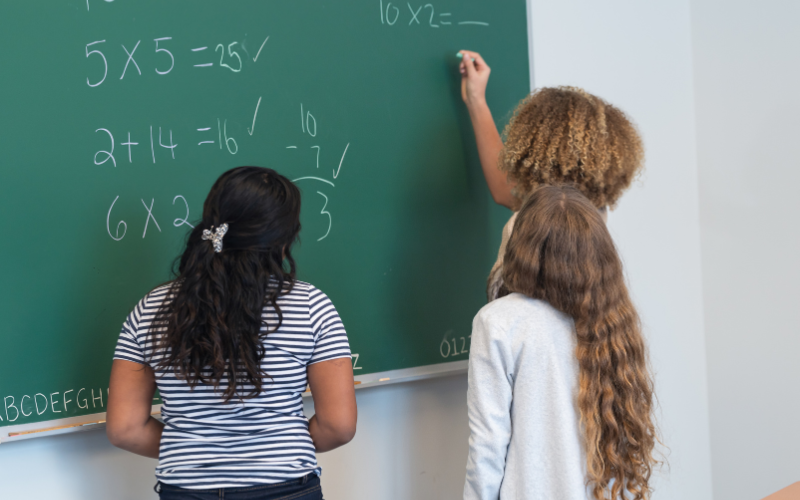Using your mathematics community to develop students’ mathematical identity and mathematical agency

In the November 2023 edition of this digital newsletter, we discussed the prevalence of math anxiety among our students as young as elementary school. We shared that the 2012 PISA study revealed as many as 59% of 15 and 16-year-olds expressed worry about the mathematics classroom; and this anxiety can begin as early as first grade (Luttenberger et al., 2018). In addition, we shared several strategies for how teachers can structure the classroom environment and engage with students to help lessen this anxiety for students of all ages. This month, we would like to take this a few steps further and discuss how we can use our classroom environment to help students develop a positive math identity and emboldened math agency, which can lessen their math anxiety.
First, what are math identity and math agency? Math identity refers to how one views oneself as a knower and doer of mathematics (National Council of Teachers of Mathematics, 2020). Furthermore, this view impacts how an individual feels about their ability to do mathematics and engage in mathematical tasks, which is the basis for mathematical agency (National Council of Teachers of Mathematics, 2020). What is math agency? Math agency refers to an individual’s math identity in action and how an individual is “able to express [themselves] and use their own ideas in mathematical problem solving and authoring” (LaMar, 2020, p. 2097).
Suppose we want to create a classroom environment where students can develop a positive math identity and demonstrate bold math agency where they are willing to think outside the box, explore, and make mistakes. As their teachers, what do we need to do to support their journey? We need to take a step back and allow our students to create their mathematical understanding through productive struggle where they grapple with the concept, make mistakes, and help each other develop their understanding (LaMar, 2020; University of San Diego Professional and Continuing Education, 2023). We need to allow students to collaborate with their peers frequently where they have the opportunity to share ideas and sensemaking while also using math talk. Likewise, we need to allow students to explain their thinking and model for their peers. They will feel empowered to express themselves and learn that they have a valuable voice in the learning process and in order for us, as their teachers, are not the sole authority on math knowledge (LaMar, 2020). Moreover, we need to use this sharing of ideas to help students become comfortable with making mistakes. Allow students to show incorrect thinking and use it to promote discussion on how thinking can be corrected. This discussion will have more of a positive impact than always focusing on the “right way,” and it will help those who struggle with math to see it is okay to make mistakes and not always get it right on the first, second, or even tenth try (LaMar, 2020; University of San Diego Professional and Continuing Education, 2023). How will you help your students develop their own positive mathematical identity and possess strong mathematical agency?
See the resources and reference materials for more information on math identity and math agency.
Resources
Humphreys, C., & Parker, R. (2015). Making number talks matter: Developing mathematical practices and deepening understanding, grades 4-10. Stenhouse Publishers.
Lempp, J., & Parrish, S. (2022). Math workshop: Five steps to implementing guided math, learning stations, reflection, and more. Heinemann.
Liljedahl, P. (2021). Building thinking classrooms in mathematics, grades K-12: 14 teaching practices for enhancing learning. Sage Publications Inc.
REL Northwest. (2019). Promoting a positive math identity: Module 1: The importance of math identity for math success. https://ies.ed.gov/ncee/edlabs/regions/northwest/pdf/math-training-modules/module1-ppt.pdf
The Charles A. Dana Center. (2019). Inside mathematics: Number talks. The University of Texas at Austin. https://www.insidemathematics.org/classroom-videos/number-talks
References
LaMar, T. (2020). Relationships with mathematics: The importance of agency and authority. Mathematics Education across Cultures: Proceedings of the 42nd Meeting of the North American Chapter of the International Group for the Psychology of Mathematics Education. https://doi.org/10.51272/pmena.42.2020-353
Luttenberger, S., Wimmer, S., & Paechter, M. (2018). Spotlight on math anxiety. Psychology Research and Behavior Management, Volume 11(11), 311–322. https://doi.org/10.2147/prbm.s141421
National Council of Teachers of Mathematics. (2020). Catalyzing change in early childhood and elementary mathematics. National Science Teaching Association.
University of San Diego Professional and Continuing Education. (2023). What is productive struggle? [+ Strategies for teachers]. University of San Diego – Professional & Continuing Education. https://pce.sandiego.edu/productive-struggle-in-the-classroom/
For more information, contact Leslie Murphy Brown (lmmurphybrown@vcu.edu), Program Specialist, T/TAC at VCU.
Categories Inclusive Practices, Math